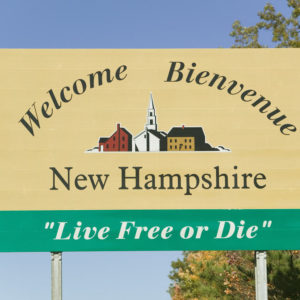On Tuesday, the Tax Foundation released its annual State Business Tax Climate Index, and the only New England state in the top 10 — or 20 or even 30 — was New Hampshire.
The list, which “compares the business tax climate of all states,” put New Hampshire at number six, up one from last year. The next closest New England state was Maine at number 33, with Massachusetts at 36, Vermont at 44 and Connecticut at 47.
“Once again, New Hampshire is leading New England,” said Governor Chris Sununu in a statement. “The Granite State is opening up doors of opportunity for individuals, families, and businesses by relentlessly focusing on a pro-jobs, pro-growth agenda. This encouraging trend is not by accident – it’s by design, and we will continue this positive movement by governing in a responsible and fiscally conservative manner.”
Jared Walczak, Director of State Policy at the Tax Foundation told NHJournal that, “while some of its northeastern peers have never met a tax they didn’t like, New Hampshire forgoes both sales and wage income taxes, and just trimmed the rates of the state’s two major business taxes. The ‘Live Free or Die’ state has always prioritized light tax burdens, and has made structural improvements to the tax code in recent years that make the state highly competitive both regionally and nationally.”
The Tax Foundation credits New Hampshire’s high standing in part to “trimming the rates of both its Business Profits Tax (a corporate income tax), and its Business Enterprise Tax (a value-added tax).” That’s particularly satisfying to New Hampshire Republicans who stuck with Sununu through the recent state budget battle. Despite a substantial Democratic majority in both the House and Senate, Sununu was able to turn back repeated attempts to raise these business taxes — and even create a payroll tax — thanks to a GOP minority that hung together to sustain his vetoes.
Some New Hampshire Democrats remain unimpressed. “After repeated Republican corporate tax cuts, largely benefitting out-of-state corporations, New Hampshire stays the 6th best overall business tax climate, because the real driver is skyrocketing property taxes on our small businesses right here in New Hampshire,” Senate Majority Leader Dan Feltes told NHJournal. “Fortunately, the Democratic budget that Chris Sununu eventually signed, after months of his post-veto political posturing, provides real relief to our communities and to our property tax payers.”
Democrats like Feltes and House Majority Leader Doug Ley repeatedly attack these tax cuts as “more tax breaks for out-of-state corporations.” In fact, while large out-of-state corporations do generate most of the revenue, “94.7 percent of employers who paid New Hampshire business taxes were local companies,” the Josiah Bartlett Center reports.
Opponents also predicted business tax revenues would plunge in the wake of these cuts. Instead, business tax revenues are up, the state has a $200 million surplus, and a record number of Granite Staters are in the workforce.
The Tax Foundation’s “thumbs up” to New Hampshire tax policy is just the latest in a series of high rankings for New Hampshire’s economic success. A new Kiplinger analysis released earlier this month rated New Hampshire one of the “Ten Most Tax-Friendly States in the U.S.,” and the only tax-friendly state in New England. And 24/7 Wall St. ranked New Hampshire’s economy number four in the nation earlier this year, based on GDP growth, job growth, unemployment rate, poverty rate, and bachelor’s degree attainment rate. New Hampshire was also ranked the fourth-most prosperous state in the country, and with the best living conditions.
Still, New Hampshire’s business taxes remain higher than the national average, as BIA President Jim Roche noted to NHJournal:
“While rankings on individual and sales taxes are strong, New Hampshire continues to compare poorly with other states when looking at overall corporate tax rates. While New Hampshire’s ranking continues to move up – having gone from number 47 two years ago to 45 last year to now at 43 – there is still a lot of room for improvement. This is why we think attempts to freeze or rollback NH business tax rates are misguided.”
The ultimate ranking comes from the voters. If the good economic news continues, the Democrats’ uphill climb to defeat Sununu in 2020 will get even steeper.

